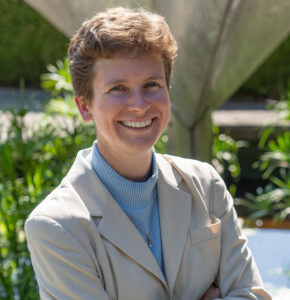
Colleagues in the Wild
 “I’ve got the love of Jesus down in my heart!”
“I’ve got the love of Jesus down in my heart!”
“Where?!”
“Down in my heart!”
“Where?”
“Down in my heart to stay!”
We sang as we sat around the campfire at our Minam Lake campsite in the Wallowa Mountains. It was a discovery. So many of us knew the same camp songs, even though we’d all grown up in different places. Mark started it. Sitting in our camp chairs waiting for our quinoa-pistachio-apricot-cardamom dinner to cook – which takes a little while on a backpacking stove – Mark said, “I’ve got this old song stuck in my head: I’ve got the love of Jesus…” Bob merged his voice, “Down in my heart!” Nicole shouted back, “Where?” and suddenly everyone was part of it.
I joined in as I stirred the quinoa and watched my colleagues – yes, nine of my faculty colleagues – finish one song and start another. We had a good old-fashioned camp song sing-along on our last night on the trail. As we’d gotten to know one another over the past four days, we’d grown more comfortable with each other, willing even to venture into silliness because we felt cared for by one another. We’d found the joy of relationship and connection.
Last year I proposed to my dean that I offer a summer backpacking trip for faculty focused on wilderness spirituality. I lead these January-term courses for students, so why not offer them for faculty, who also need care and connection? My dean told me to run with it, and the Wabash Center graciously approved a grant for the experience. So here we were, ten colleagues in the Eagle Cap Wilderness of the Wallowa Mountains for five days. Some colleagues had backpacked before, some hadn’t. Some knew each other to varying extents; one person knew no one at all. But here we were on the last night, singing camp songs together because we had discovered shared experiences of faith formation and malformation and deep bonds of friendship and colleagueship. We knew we were in this together.
That’s been the big takeaway from the trip: We are now more together in our work. I’ve written a lot in this blog series about how outdoor and immersive classes bring students together and enhance learning. Turns out, they do those things for colleagues, too. We began as generally collegial with one another, but now we have experiences of having to rely on one another. We have experiences of being (appropriately and by choice) vulnerable with one another. We built a space of trust where being vulnerable felt like a valid option, whether that vulnerability was needing help when the trail was steep, sharing a personal struggle with faith on a partnered walk, or just being free and silly with one another. We experienced laughing together and talking about things other than work. We worshiped together with morning and evening liturgy.
When we came back to work this fall, those experiences stayed with us, and we found ourselves gravitating to one another during opening faculty days. We look for each other when we need support. We look for each other when we need a laugh or a camp song. We look for each other when we need to know we are understood. And so, we enter the service of our students and our other colleagues from a position of mutual support, which makes us all feel able to serve from reserves rather than from the fumes of energy long gone. We have space for creativity and imagination, and so we are thinking once more about new ways to teach and work than how we always have.
A wilderness trip does these things in part by the nature of what the trip requires – interdependence, participation, risk, challenge, struggle, presence – and what is absent – normal rhythms and distractions, phones, any pretense about who we are (when you live in tents with your colleagues for a week, you can’t hide much from one another). Good facilitation and the willingness of participants to engage in these practices is also required to bring about the care and connection. But none of these things are limited to a wilderness trip. Gathering with colleagues in any place outside of normal work spaces in an immersive experience that requires a little bit of trust in one another; any setting that requires people to need each other; any experience of being present, away from normal distractions, and of talking about something other than teaching, scholarship, and service will do these things.
As much as I like to think of the trail as magic, it is not. The magic is simply intentionality and imagination. All of us need care from and connection with one another, and most of our financially-strapped schools are unlikely to provide it. Who among your colleagues could you start with? What could you propose you do together? Can you think of ways to structure a group challenge or even talk about a challenge you are already in together? If you’ve done a Wabash Center workshop or roundtable, think of the ways they’ve build meaningful connection among faculty and try to imitate what you’ve experienced, as leader instead of participant. With a little intentionality and imagination, we can connect with our colleagues in meaningful ways that make our institutions places of possibility rather than places of staleness. They might even become places of spontaneous singing.
Leave a Reply